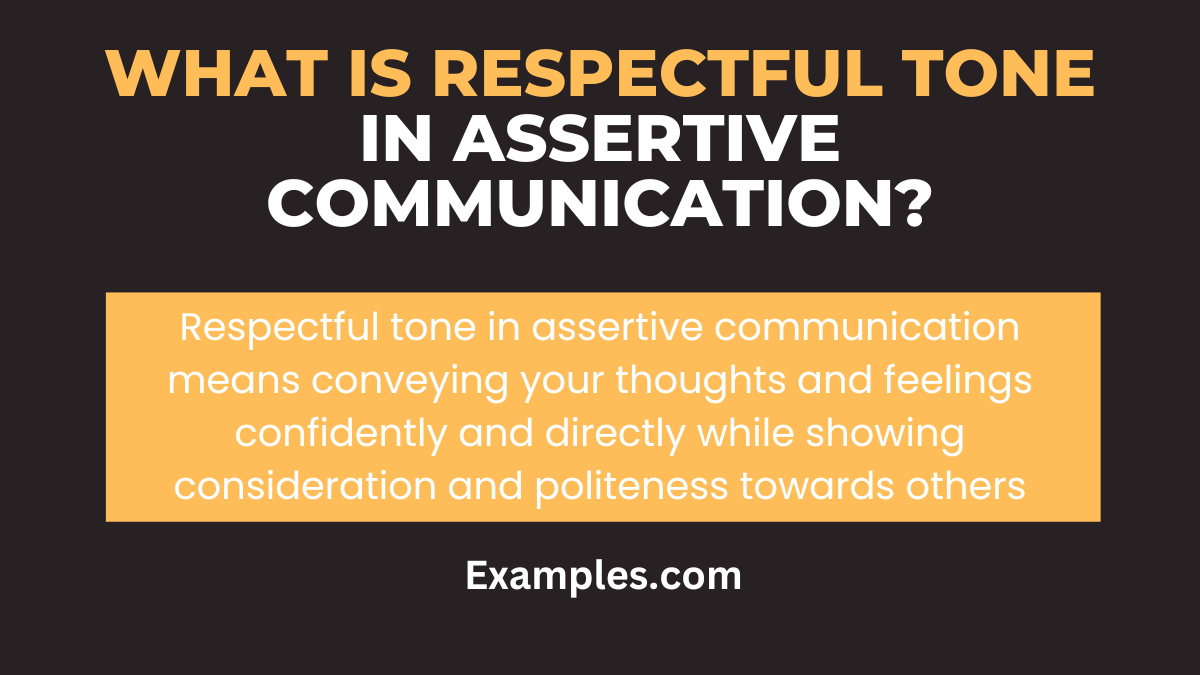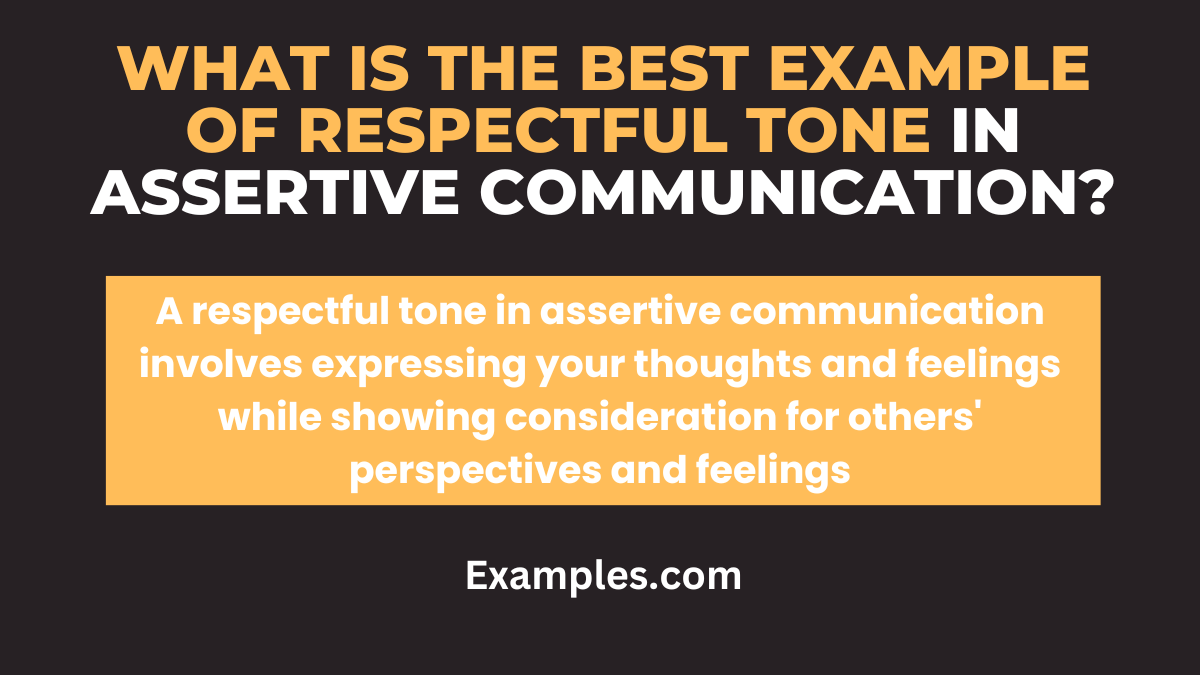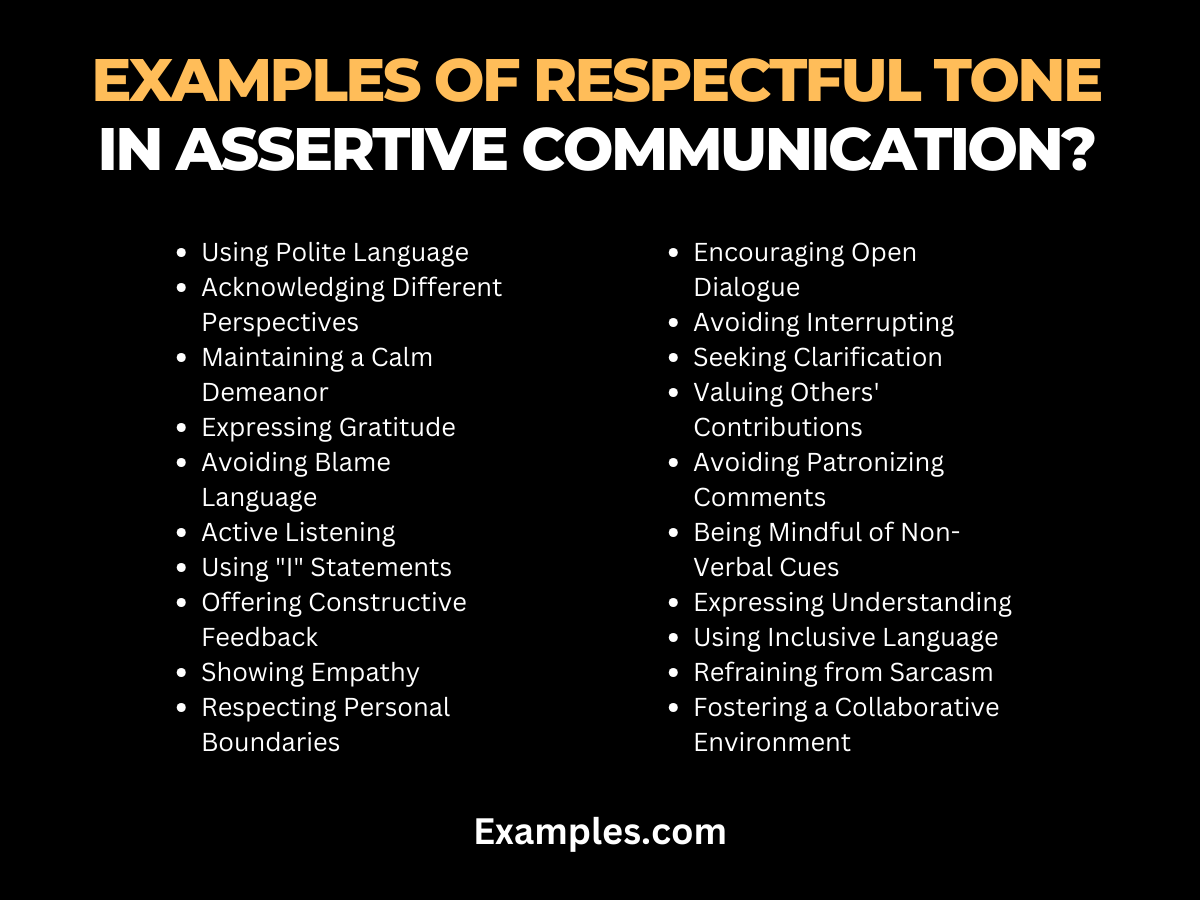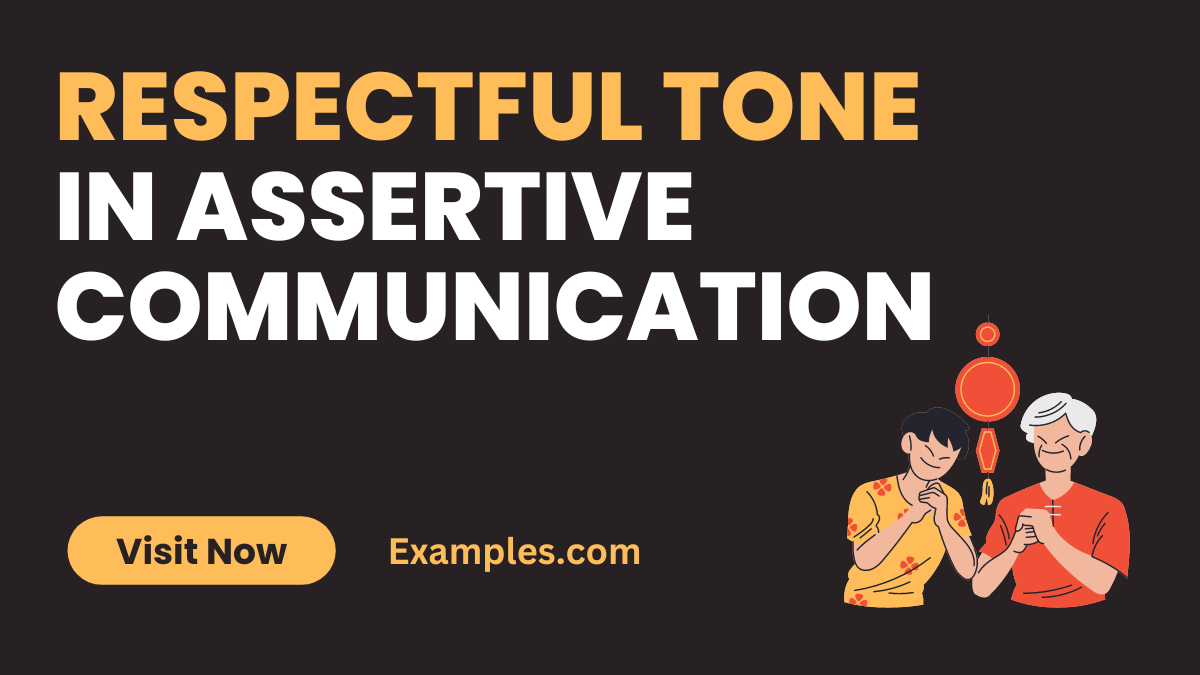Respectful Tone in Assertive Communication
Respectful Tone in Assertive Communication is an essential skill for effective and empathetic interactions. This comprehensive guide delves into the nuances of marrying assertiveness with respect, crucial for both personal growth and professional development. Whether in conflict resolution, giving feedback, or expressing needs, mastering this skill enhances your communication repertoire, making it more impactful and considerate.
What is Respectful Tone in Assertive Communication?

Respectful Tone in Assertive Communication refers to the ability to express oneself confidently and clearly, while maintaining a tone of respect and understanding towards others. This approach combines the directness of assertive communication with empathy and consideration, ensuring that the message is conveyed without offending or belittling the recipient. It’s a balance of being honest and firm about one’s needs and opinions, yet doing so in a way that acknowledges and respects the perspectives of others.
What is the Best Example of Respectful Tone in Assertive Communication?

A prime example of a Respectful Tone in Assertive Communication can be seen when an individual addresses a disagreement in a team meeting. Instead of resorting to blame or passive-aggressiveness, they use I Statements in Assertive Communication. They might say, “I understand your point, but I have a different perspective.” This approach shows a direct yet respectful stance, acknowledging the other person’s view while clearly stating their own. Another instance could be providing Constructive Feedback in Assertive Communication. Instead of criticizing, they offer feedback in a positive tone, focusing on solutions and improvements, like saying, “I appreciate your effort on this project. Maybe we could try this approach for better results.
20 Examples of Respectful Tone in Assertive Communication?

Utilizing a respectful tone in assertive communication is vital in conveying your message effectively while maintaining a positive interpersonal relationship. It involves expressing your views and needs clearly and directly, yet in a manner that respects others’ opinions and feelings. This approach fosters understanding, reduces conflict, and enhances dialogue.
- “I understand your point, but I see it differently. Here’s my perspective…”
Acknowledges the other’s viewpoint before presenting your own, showing respect for differing opinions. - “I feel concerned when you do that. Could we try a different approach?”
Uses “I” statements to express feelings without blaming, fostering a constructive conversation. - “I appreciate your efforts. However, I believe there might be another solution to this.”
Expresses gratitude before suggesting an alternative, maintaining a positive tone. - “I respect your decision, but I would like to add my thoughts on this matter.”
Shows respect for the other’s decision while confidently sharing your own views. - “I need some time to think about this. Can we discuss it later?”
Politely asks for time to reflect, indicating a desire for thoughtful communication. - “I value your input, but here’s what I think would work best for us.”
Values the other person’s suggestions before presenting a personal opinion. - “I hear what you’re saying and would like to offer a different perspective.”
Demonstrates active listening and introduces an alternate viewpoint respectfully. - “I understand where you’re coming from, but I have some concerns.”
Shows empathy and understanding before expressing personal concerns. - “I appreciate your viewpoint. Let’s find a middle ground.”
Acknowledges the other’s perspective and suggests collaboration. - “I respect your expertise in this area, yet I would like to explore other options.”
Acknowledges the other’s knowledge while suggesting further exploration. - “I feel uncomfortable with this arrangement. Can we modify it?”
Expresses discomfort in a non-confrontational manner, seeking a solution. - “I think your idea has merit, but here’s another aspect to consider.”
Validates the other’s idea before adding additional thoughts. - “I respect your time and effort, but I have some different ideas.”
Shows appreciation for the other’s contributions before presenting alternate ideas. - “I understand your constraints, but let’s work together to find a solution.”
Recognizes the other’s limitations and encourages collaborative problem-solving. - “I value your honesty. Let’s discuss how we can improve this together.”
Praises honesty and promotes teamwork in addressing issues. - “I know you’re busy, but I need a moment to discuss something important.”
Acknowledges the other’s schedule while asserting the need to communicate. - “I appreciate your quick response, yet I have some additional questions.”
Thanks the other for their promptness before raising further inquiries. - “I respect your experience, and I’d like to add my observations.”
Respects the other’s background while sharing personal insights. - “I feel we’re not on the same page. Can we clarify our goals?”
Non-confrontationally addresses a misalignment and seeks clarification. - “I acknowledge your challenges. How can I help in resolving this?”
Shows understanding of the other’s difficulties and offers assistance.
Importance of Respectful Tone in Assertive Communication
- Enhances Mutual Respect: A respectful tone in assertive communication fosters a sense of mutual respect. This makes both parties more receptive to each other’s viewpoints, promoting a healthier dialogue.
- Reduces Conflict: Using a respectful tone helps in de-escalating potential conflicts, ensuring discussions remain constructive and focused on resolution.
- Improves Clarity: Respectful communication aids in delivering messages with greater clarity. This minimizes misunderstandings and ensures that the main points are conveyed effectively.
- Builds Positive Relationships: Regular use of a respectful tone in assertive communication strengthens interpersonal relationships, be it in personal or professional settings.
- Encourages Openness: People are more likely to be open and honest in their communication when they feel respected. This leads to more productive and meaningful conversations.
- Facilitates Empathy: A respectful tone embodies empathy, allowing communicators to understand and acknowledge each other’s perspectives better.
- Boosts Confidence: Knowing how to communicate assertively yet respectfully boosts self-confidence, as individuals feel equipped to handle various communication scenarios effectively.
- Promotes Positive Feedback: In environments like the workplace, a respectful tone ensures that feedback, even when critical, is received in a positive and constructive manner.
Role of Respectful Tone in Assertive Communication
- Establishes Credibility: Communicating assertively with respect establishes a person’s credibility, making their words carry more weight and respect.
- Balances Emotions and Logic: It helps in balancing emotional responses with logical arguments, ensuring that the communication is effective and rational.
- Enhances Active Listening in Assertive Communication: A respectful tone encourages active listening, crucial for understanding the other person’s perspective and responding appropriately.
- Promotes Clear Expression in Assertive Communication: Clear expression is vital in assertive communication. A respectful tone ensures that the message is not only clear but also well-received.
- Facilitates I Statements in Assertive Communication: Using “I” statements with a respectful tone helps in expressing personal feelings and opinions without sounding accusatory or confrontational.
- Supports Emotional Control: It aids in maintaining emotional control during conversations, preventing the escalation of tension and misunderstandings.
- Encourages Constructive Conflict Resolution: In conflict resolution, a respectful tone is key in finding mutually beneficial solutions while respecting each party’s views.
- Strengthens Team Dynamics: In team settings, respectful assertive communication is essential for maintaining a positive and collaborative atmosphere, encouraging teamwork and productivity.
Maintaining a respectful tone in assertive communication is paramount for effective interactions. By incorporating the non-verbal assertiveness techniques mentioned earlier, individuals can convey their messages confidently and empathetically. This guide has provided valuable tips for mastering this skill, ensuring that assertive communication fosters respect and understanding in various contexts.



